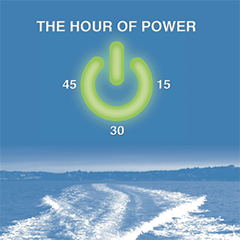The offshore industry is now
recognising the potential of
utilising hybrid power linked to innovative propulsion systems. However, the cost of adopting hybrid technology on retrofit projects and new vessels requires a viable business case to justify higher capital
expenditure (CAPEX).
Offshore maritime cannot afford to go ‘green’ for no reason; there simply is not the margin to add on another layer of costs. They need a viable business case or they need a compliance case. Which raises the burning question – how can the offshore sector finance hybrid marine power?
Other transport sectors around the world are successfully utilising hybrid systems. Automotive manufacturers including Tesla and BMW are re-defining energy possibilities for land transport. The technology is transitioning from high performance automobiles to city busses and the future of aviation.
Technology Readiness Level (TRL) is rated 1 to 9. Component parts of maritime hybrid powertrains typically achieve TRL8. By definition this is, ‘actual system completed and qualified through test and demonstration’. But maritime needs to move up to TRL9, ‘actual system proven through successful mission operations’.
Emissions Compliance versus Engineering Efficiency
Dramatically reducing pollution in both water and air, particularly in ports and around people to maintain their health, is becoming the most significant driver for change in the maritime sector since coal and steam gave way to heavy fuel oil which has evolved into our current diesel fuels.
On a global scale, the International Maritime Organisation (IMO) in 2018 adopted a strategy on the reduction of greenhouse gas (GHG) emissions from ships. The IMO set out a vision to reduce GHG emissions from international shipping and phase them out as soon as possible in this century. This is an ambitious commitment with targets to reduce emission levels of CO2, SOx, NOx and particulate matter.
Professional mariners already know about MARPOL legislation relating to marine pollution, plus the serious financial implications of vessels and operators getting it wrong. Emissions from internal combustion engines using fossil fuels will come at an increasingly heavy price over the next few years as countries, regions and individual maritime cities take action. Paris, London and Amsterdam will set high level air quality standards for rivers and estuaries that other ports will follow.
These drivers are encouraging offshore operators to rapidly become interested in next generation power. However approaching ‘hybrid’ energy use from a purely ’green’ or ‘compliance’ viewpoint may miss significant opportunities to improve engineering efficiency, improve safety and reduce operating costs.



























